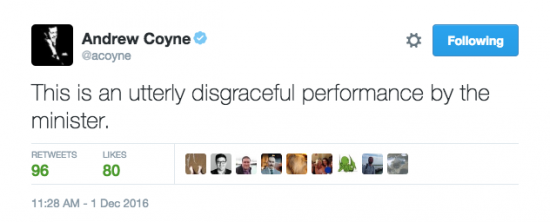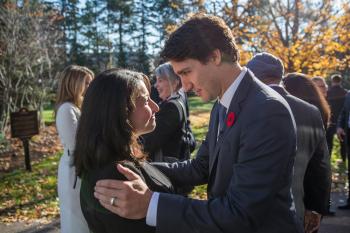Predictably, Justin Trudeau's clear and precise campaign promise -- that the 2015 federal election would be the last under first past the post -- has become a giant tire fire.
The special committee of MPs tasked with studying electoral reform in Canada released its report today, on schedule. It recommended that Canada prepares to move toward a proportional representation system, ultimately decided by a referendum.
Monsef spent the weekend undermining her colleagues' work on the electoral reform committee, stating that there would be no movement on electoral reform until enough Canadians want it. Perhaps we should hold a general election with electoral reform as a major policy plank and then see who gets elected on the back of that promise.
The Liberals, who designed and chaired the committee, disagreed with the conclusion of their colleagues and then Maryam Monsef, the minister of democratic institutions, lied about it.
First, Monsef said in Question Period that the committee hadn't reached a consensus. It had. Then she said she had directed the committee to develop an alternative voting system. She hadn't. Then she chastised her colleagues for not making a recommendation for a new system, when in fact, that's exactly what they've done.
"This is huge," said a clearly frustrated and smarting Elizabeth May, Green Party leader and committee member, in a press conference. "We've recommended that we move away from first-past-the-post and towards proportional representation."
They "did not complete the hard work we expected them to," Monsef said. The committee started its work in the summer. It heard from 196 witnesses all over the country and received 22,500 responses online. "Stop it." NDP MP Nathan Cullen said in the scrum afterward. "People aren't stupid."
Cullen also had nothing but scorn for Monsef's follow-up plan, a "postcard" campaign for Canadians to send in their thoughts on electoral reform, despite the fact that was the exact mandate the committee had just fulfilled. It's a "dating service," he said.
Most comical, however, was when Monsef claimed that the committee had recommended "Gallagher's index" instead of an electoral system, which is simply false.

"We believe most Canadians would not want their future elector system decided solely on the basis of a complex mathematical system," reads the Liberals' supplementary report. "This would be difficult to explain and would be a radical change that we think would be unacceptable to Canadians."
This is a classic, even gaudy example of proportional representation-opponents claiming that it is too complicated. First of all, Gallagher's index is pretty straightforward as formulas go. Second, it is not a voting system, nor was it presented as one. It is simply one measurement among many for evaluating the proportionality of a voting system.
More importantly, there would be no reason for any Canadian who wasn't designing the system to consult it. How many Canadians need to understand the Gini coefficient when voting for economic platforms? And isn't this supposed to be the party of science-based decisions?
In a breathless display of cynicism, Monsef simply put a scary equation on the report -- and later held up a picture of it at the scrum -- because she knew it would seem confusing. She might as well have held up a picture of "electoral reform" in the original Greek (την εκλογική μεταρρύθμιση), shaking her head sadly at the poor Canadians who would have to learn this inscrutable language.
"This is an utterly disgraceful performance by the minister," said Andrew Coyne on Twitter.

Two days after Justin Trudeau approved two massive pipeline projects while waxing about how much he cares for the environment and surfing in general, his minister specifically tasked with reforming Canada's electoral system makes a mockery of anyone who believed that politics in the post-Harper era might actually mean something.
Like this article? Please chip in to keep stories like these coming.
Image: Facebook/Maryam Monsef




Comments
Do
Don't